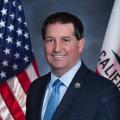14th Assembly District
Not in 14th Assembly District? Find your guide.
RETURN BALLOTS BY TUESDAY, MARCH 3RD
The Courage California Voter Guide compiles the information that allows you to make informed decisions about the races on your ballot, based on your values. Vote in every race on your ballot! It's our right and our responsibility. Please share this guide with your friends and family.
8th Congressional District
Christine “Chris” Bubser is from Pennsylvania and has lived in Mammoth Lakes for over 13 years. According to campaign materials, she’s running for office to bring responsive representation to California’s 8th Congressional district.
Bubser is a biotech engineer and healthcare advocate. The 2017 attempts to dismantle the Affordable Care Act led her to advocate in Washington, and she decided to run for office after the indifference she experienced. In her community, Bubser is a trustee at her Temple and a co-founder of HODG (HangOutDoGood), a grassroots community of hundreds of volunteers who work to elect progressive candidates.
Bubser is running against nine other candidates: Bob Conaway (D), James Ellars (D), Tim Donnelly (R), Jerry Laws (R), Jay Obernolte (R), Jeremy Staat (R), Justin David Whitehead (R), Jeff Esmus (NPP). Incumbent Paul Cook (R) is not seeking re-election. Recent election results show it's hard for Democrats to win this seat. Chris Bubser is the best progressive choice thanks to endorsements from over a dozen progressive organizations, elected officials, and community leaders.
According to our analysis, Chris Bubser is the strongest choice for progressive leadership in office.
Christine “Chris” Bubser is from Pennsylvania and has lived in Mammoth Lakes for over 13 years. According to campaign materials, she’s running for office to bring responsive representation to California’s 8th Congressional district.
Bubser is a biotech engineer and healthcare advocate. The 2017 attempts to dismantle the Affordable Care Act led her to advocate in Washington, and she decided to run for office after the indifference she experienced. In her community, Bubser is a trustee at her Temple and a co-founder of HODG (HangOutDoGood), a grassroots community of hundreds of volunteers who work to elect progressive candidates.
Bubser is running against nine other candidates: Bob Conaway (D), James Ellars (D), Tim Donnelly (R), Jerry Laws (R), Jay Obernolte (R), Jeremy Staat (R), Justin David Whitehead (R), Jeff Esmus (NPP). Incumbent Paul Cook (R) is not seeking re-election. Recent election results show it's hard for Democrats to win this seat. Chris Bubser is the best progressive choice thanks to endorsements from over a dozen progressive organizations, elected officials, and community leaders.
According to our analysis, Chris Bubser is the strongest choice for progressive leadership in office.
State Assembly, 14th District
Assemblymember Tim Grayson has lived in the East Bay for nearly 20 years. He is the incumbent, having served in this position since 2017. According to campaign materials, he is running to keep his seat to continue to prioritize safe and secure neighborhoods in his district.
In the State Assembly, Assemblymember Grayson is currently working on passing a cap on interest rates on consumer loans that target financially vulnerable families with unaffordable loans that they cannot repay. He has also authored legislation that aims to increase transparency and accountability in the University of California system and to streamline the development of areas affected by military base closures into commercial and residential areas. Assemblymember Grayson currently serves as Chair of the Select Committee on Streamlining Services for Victims of Interpersonal Violence, and is a member of committees including Banking and Finance, Business and Professions, and Insurance. Prior to his election to the State Assembly, he served as Concord Councilmember and Mayor, and founded the Family Justice Center to support victims of domestic violence, child and elderly abuse, and human trafficking in the Concord area. He also worked as the City of Concord’s police chaplain directly working with survivors of violent crimes, their families, and first responders.
Assemblymember Grayson has helped to protect consumers and victims of domestic violence, child and elderly abuse, and human trafficking. He has also supported key legislation that strengthens the rights of formerly incarcerated people. That said, he often votes against or abstains from key progressive bills that address the needs of those very same communities, leading to a mixed track record on progressive legislation.
Assemblymember Grayson is being challenged by Janell Proctor (R) and Cassandra Devereaux (PFP). According to recent election results, Democrats usually win this seat. Though we question Assemblymember Grayson’s lack of support for key progressive legislation and would encourage him to use his close relationship with the police to push for criminal justice reforms, his strong base in District 14 and commitment to protecting Californians in a variety of ways makes him the strongest choice for progressive leadership in this race.
Assemblymember Tim Grayson has lived in the East Bay for nearly 20 years. He is the incumbent, having served in this position since 2017. According to campaign materials, he is running to keep his seat to continue to prioritize safe and secure neighborhoods in his district.
In the State Assembly, Assemblymember Grayson is currently working on passing a cap on interest rates on consumer loans that target financially vulnerable families with unaffordable loans that they cannot repay. He has also authored legislation that aims to increase transparency and accountability in the University of California system and to streamline the development of areas affected by military base closures into commercial and residential areas. Assemblymember Grayson currently serves as Chair of the Select Committee on Streamlining Services for Victims of Interpersonal Violence, and is a member of committees including Banking and Finance, Business and Professions, and Insurance. Prior to his election to the State Assembly, he served as Concord Councilmember and Mayor, and founded the Family Justice Center to support victims of domestic violence, child and elderly abuse, and human trafficking in the Concord area. He also worked as the City of Concord’s police chaplain directly working with survivors of violent crimes, their families, and first responders.
Assemblymember Grayson has helped to protect consumers and victims of domestic violence, child and elderly abuse, and human trafficking. He has also supported key legislation that strengthens the rights of formerly incarcerated people. That said, he often votes against or abstains from key progressive bills that address the needs of those very same communities, leading to a mixed track record on progressive legislation.
Assemblymember Grayson is being challenged by Janell Proctor (R) and Cassandra Devereaux (PFP). According to recent election results, Democrats usually win this seat. Though we question Assemblymember Grayson’s lack of support for key progressive legislation and would encourage him to use his close relationship with the police to push for criminal justice reforms, his strong base in District 14 and commitment to protecting Californians in a variety of ways makes him the strongest choice for progressive leadership in this race.
Statewide Ballot Measures
This proposition would provide $9 billion for desperately needed renovations to public preschools and grade schools throughout the state, and $6 billion for construction to community colleges, the Cal State system, and the UC system. This will allow the state of California to use tax revenue to pay for improvements that local communities cannot afford.
The funding would come from bonds the state would pay back over 35 years, totaling an estimated $26 billion, which includes $15 billion in principal and $11 billion in interest. This investment is well worth the costs. It takes money, after all, to ensure that students -- especially those in districts that can’t afford major capital improvement projects -- do not have to learn in dangerous environments.
The vast majority of Democrats in the state legislature support it, as does Gov. Newsom, and the only major opposition is a group called the Howard Jarvis Taxpayers Association. This is the group famous for destroying California’s school funding system in 1978 through another proposition, ironically one that was also dubbed Prop 13. The group spends most of its time lobbying to reduce tax rates. It has never shown any interest in supporting California’s children, at least if that means wealthy individuals or giant corporations would pay their fair share in taxes.
Critics of the measure have pointed out that the ballot measure’s language includes a provision that frees new multi-family developments around subway stops and bus stations from school impact fees. This provision will make it easier for developers to build apartment buildings within a half-mile of public transit but could also drive up the cost of new housing and take funds away from school districts across the state. Despite this provision, the measure is still supported by most education groups in the state, who believe the overall funding allocation to schools outweighs the impact of reduced funding to school districts located near transit hubs. 2020’s Prop 13 is worth the investment since it means children will soon be able to attend school in buildings that are retrofitted to withstand earthquakes and no longer have lead in their water.
We strongly recommend a YES vote on Prop 13.
This proposition would provide $9 billion for desperately needed renovations to public preschools and grade schools throughout the state, and $6 billion for construction to community colleges, the Cal State system, and the UC system. This will allow the state of California to use tax revenue to pay for improvements that local communities cannot afford.
The funding would come from bonds the state would pay back over 35 years, totaling an estimated $26 billion, which includes $15 billion in principal and $11 billion in interest. This investment is well worth the costs. It takes money, after all, to ensure that students -- especially those in districts that can’t afford major capital improvement projects -- do not have to learn in dangerous environments.
The vast majority of Democrats in the state legislature support it, as does Gov. Newsom, and the only major opposition is a group called the Howard Jarvis Taxpayers Association. This is the group famous for destroying California’s school funding system in 1978 through another proposition, ironically one that was also dubbed Prop 13. The group spends most of its time lobbying to reduce tax rates. It has never shown any interest in supporting California’s children, at least if that means wealthy individuals or giant corporations would pay their fair share in taxes.
Critics of the measure have pointed out that the ballot measure’s language includes a provision that frees new multi-family developments around subway stops and bus stations from school impact fees. This provision will make it easier for developers to build apartment buildings within a half-mile of public transit but could also drive up the cost of new housing and take funds away from school districts across the state. Despite this provision, the measure is still supported by most education groups in the state, who believe the overall funding allocation to schools outweighs the impact of reduced funding to school districts located near transit hubs. 2020’s Prop 13 is worth the investment since it means children will soon be able to attend school in buildings that are retrofitted to withstand earthquakes and no longer have lead in their water.
We strongly recommend a YES vote on Prop 13.

